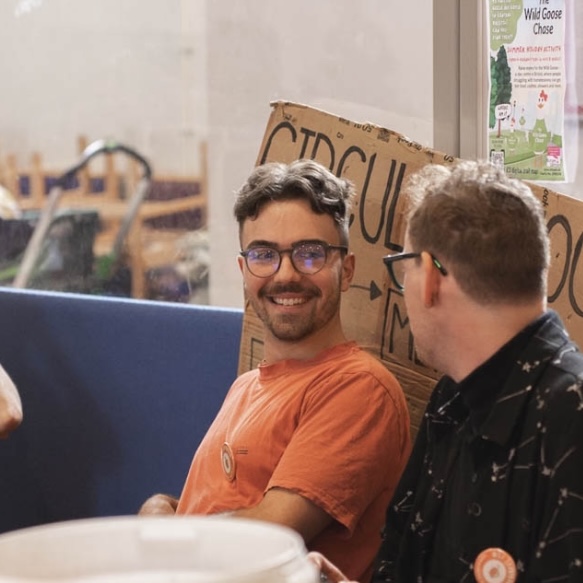Living Compost and How To Make It
- Alex Montgomery
- Jan 15, 2025
- 3 min read
Updated: Dec 26, 2025
Living compost is not just decomposed waste.
It is a living system.
At its best, compost becomes biologically complete soil, rich with fungi, bacteria, nematodes, protozoa, and billions of other microorganisms working together below the surface. These organisms form the soil food web, the network that retains nutrients, builds structure, and supports around 95 percent of the food we eat.
At Generation Soil, living compost sits at the heart of everything we do. It is how we turn food waste into fertility and rebuild soil health across Bristol.

What Is Living Compost?
Living compost is compost that still contains life.
Unlike sterilised or industrial compost products, living compost is biologically active. It contains thriving microbial communities that continue working once added to soil. These microbes break down minerals, make nutrients available to plants, and help soils regulate water, carbon, and air.
This biological activity is what transforms compost from a soil conditioner into a regenerative force.
Living compost:
Feeds plants slowly and naturally
Builds soil structure and prevents compaction
Improves water absorption and retention
Supports biodiversity above and below ground
Healthy soil behaves like a sponge. It absorbs rainfall, reduces flooding, and holds moisture through dry periods. Living compost is what gives soil this resilience.
Why Living Compost Must Be Made Locally
Biologically complete soil cannot be rushed or mass-produced.
Living compost requires time, care, oxygen, carbon, and microbial diversity. Industrial systems prioritise speed, scale, and consistency, often at the cost of life itself.
At Generation Soil, we work at a small, local scale. This allows us to:
Control material quality
Preserve microbial life
Avoid contamination
Tailor compost to food-growing soils
Once ready, our living compost is distributed to members and redistributed to gardens, allotments, and growing spaces across Bristol, improving biodiversity both above and below ground.
How We Make Living Compost
Our process is designed to support biology at every stage.
Step One: Preparing the Food Waste
The journey begins with food waste collected in 20-litre tubs. Each bucket is sprinkled with bokashi, a dry mix of bran and molasses inoculated with beneficial microorganisms.
Bokashi fermentation:
Kickstarts decomposition
Prevents odours
Preserves nutrients
Creates ideal conditions for microbial growth
This pre-fermentation phase stabilises food waste before composting begins.
Step Two: Enriching with Biochar
Next, we add biochar, a form of activated charcoal inspired by Indigenous soil practices in the Amazon.
Biochar is highly porous, full of microscopic chambers that act as long-term housing for microbes and fungi. Once charged with nutrients, it:
Improves water retention
Increases carbon storage
Provides refuge for mycelium and bacteria
Enhances soil structure
Biochar helps lock fertility into the soil rather than letting it wash away.
Step Three: The Hot Microbial Phase
The bokashi-treated food waste is mixed with wood shavings from a local timber yard. This blend provides the ideal carbon-to-nitrogen balance.
The mix is placed into our Ridan Pro 400 in-vessel composter, where it is turned regularly to maintain oxygen and accelerate decomposition.
This is known as the hot or microbial phase.
Microbial populations can double every 20 minutes. Within hours, billions of organisms are actively breaking down organic matter. During this phase, temperatures regularly approach 70°C, a sign of intense biological activity and pathogen reduction.

Step Four: Maturation
After the hot phase, the compost is left to mature for several months.
This stage is essential.
During maturation:
Microbial communities stabilise
Fungi establish networks
Nutrients become plant-available
The compost transforms into living soil
Rushing this stage would strip the compost of its biological value. Time is not a delay, it is part of the process.

Why Choose Living Compost?
Living compost supports far more than plant growth.
Healthier Soil
Microbial diversity improves soil structure, nutrient cycling, and long-term fertility.
Climate Benefits
Living compost avoids methane emissions from landfill and helps store carbon in soil.
Biodiversity
Healthy soil supports fungi, insects, plants, and wildlife throughout the ecosystem.
Circular Food Systems
Food waste becomes soil, soil grows food, food feeds people, and the cycle continues.
Living compost closes the loop.
Living Compost in Practice: Bristol
Through the Bristol Living Compost Project, food waste collected from households is transformed into living compost used across the city. Every bucket contributes to a local circular system that regenerates soil rather than depleting it.
This is composting as community infrastructure, not waste disposal.
Join Us in Regenerating the Earth
Whether you are an allotment holder, gardener, or simply someone who wants to live more responsibly, living compost is a powerful place to start.
By choosing living compost, you are supporting:
Local soil regeneration
Community resilience
Biodiversity recovery
A circular food system
Together, we can turn waste into fertility and regenerate the earth, one handful of living compost at a time.




Comments